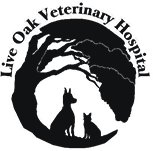Keep Them Smiling: Oral Care Recommendations for Your Pet

When we as humans go to the dentist, we know what is being done is to help keep our oral health good. Our dentist uses techniques to minimize pain and discomfort as much as possible. They also talk to us and make sure we are okay. By doing this, we accept the procedure(s) and do our best to sit still. Our pets do not understand and cannot talk to realize what is being done is to help them. So our pets react by trying to get away, fidgeting, or even trying to bite. According to the 2013 AAHA Dental Care Guidelines for dogs and cats, general anesthesia with intubation is necessary to properly assess and treat the patient. Most dental health diseases occur below the gum line where it is hard to see.
According to Dr. Christopher Garamelli, a member of the AVMA Council, “Dentistry is a huge part of veterinary medicine.” The most common oral disease in pets is called Periodontal Disease. This disease is not just found in humans. 80% of dogs and 70% of cats will have some degree of oral disease by the age of 3. Periodontal disease will worsen if not treated. The treatment of periodontal disease involves a thorough dental cleaning and x-rays may be needed to determine the severity of the disease. Your veterinarian or a board-certified veterinary dentist will make recommendations based on your pet’s overall health and the health of your pet’s teeth, and provide you with options to consider.Have your pet’s teeth checked sooner if you observe any of the following problems: bad breath, broken or loose teeth, extra teeth or retained baby teeth, teeth that are discolored or covered in tartar, abnormal chewing, drooling, or dropping food from the mouth, reduced appetite or refusal to eat, pain in or around the mouth, bleeding from the mouth, swelling in the areas surrounding the mouth. Bad breath can be a sign of dental problems and might also signify other serious health risks that include; kidney, liver, and heart muscle changes. Causes of pet dental problems are broken teeth, periodontal disease, abscesses or infections, cysts or tumors in mouth, malocclusion or misalignment of the teeth and bite, broken or fractured jaw, and palate defects ( such as cleft palate).
Veterinarians should perform an oral examination on all animals at least yearly and discuss preventative measures to keep patient’s mouth healthy. Prevention of the most common oral disease in pets consists of frequent removal of the dental plaque and tartar that forms on teeth and areas that are not kept as clean or clean at all. Regular brushing of your pet’s teeth is the most single most effective thing you as an owner can do at home and between cleanings from your vet. Periodontal Disease is graded on a scale of 0-4. O being normal and 4 being severe. Some pets become irritable when they have dental problems such as drooling more, shaking head more or even pawing at face more. If you notice any of these changes in your pet’s behavior you should prompt a visit to your veterinarian.
Veterinary dentistry includes the cleaning, adjustment, filing, extraction, or repair of your pet’s teeth and all other aspects of oral health care. These procedures should be performed by a veterinarian or a board-certified veterinary dentist. Subject to state or provincial regulation, veterinary technicians are allowed to perform certain dental procedures under the supervision of a veterinarian. There are other products out there with claims that they improve dental health. Unfortunately not all work. Talk with your veterinarian about any dental products, treats, or dental specific diets you might be considering. Or ask for recommendations for your pet.
For the month of February Live Oak Veterinary Hospital is doing 20% off dentistry, not including medications or anesthesia. For more information about Live Oak Veterinary Hospital, find us on Facebook, call us at (252)-504-2097, fax us at (252)-504-2391 or email at [email protected] .
We are located at 210 Campen Rd Beaufort, North Carolina 28516. Our hours of business are: Monday 7:30-5:30, Tuesday 7:30-6:00, Wednesday 7:30-1:00, Thursday 7:30-5:30, Friday 7:30-3:00 and closed Saturday and Sunday. We also offer boarding for your pets.
Resources for pet owners can be found at www.Avma.org/petdental , or ask your Dr. Lloyd anything you might have questions or concerns about.

